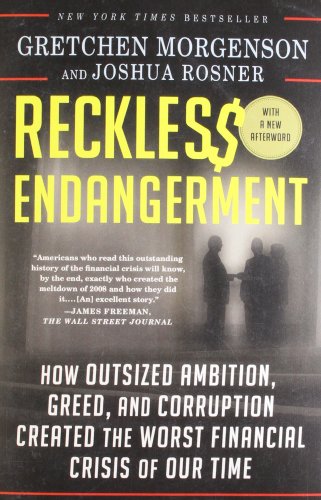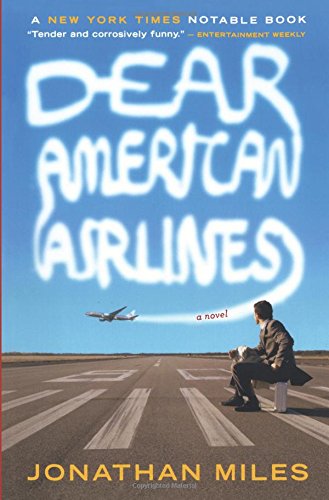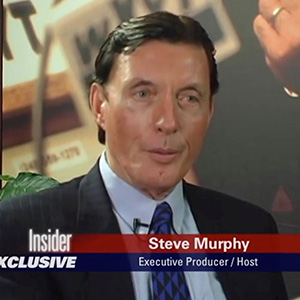Interview with Gretchen Morgenson and Jonathan Miles


Gretchen Morgenson
author of "Reckless Endangerment: How Outsized Ambition, Greed, and Corruption Created the Worst Financial Crisis of Our Time"


Jonathan Miles
author of "Dear American Airlines: A Novel"

Steve Murphy
Executive Producer & Host
Gretchen Morgenson, author of "Reckless Endangerment: How Outsized Ambition, Greed, and Corruption Created the Worst Financial Crisis of Our Time"
Gretchen Morgenson's Website
Gretchen Morgenson, The New York Times’s Pulitzer Prize-winning columnist & Best Selling Author reveals in her new bestseller, Reckless Endangerment, how the financial meltdown emerged from the toxic interplay of Washington, Wall Street, and corrupt mortgage lenders.
She and her co-author, Joshua Rosner, expose how the watchdogs who were supposed to protect the country from financial harm were actually complicit in the actions that finally blew up the American economy.
Drawing on previously untapped sources and building on original research from Joshua Rosner—who himself raised early warnings with the public and investors, and kept detailed records—Morgenson connects the dots that led to this fiasco.
Morgenson and Rosner draw back the curtain on Fannie Mae, the mortgage-finance giant that grew, with the support of the Clinton administration, through the 1990s, becoming a major opponent of government oversight even as it was benefiting from public subsidies. They expose the role played not only by Fannie Mae executives but also by enablers at Countrywide Financial, Goldman Sachs, the Federal Reserve, HUD, Congress, the FDIC, and the biggest players on Wall Street, to show how greed, aggression, and fear led countless officials to ignore warning signs of an imminent disaster.
As Gretchen shares in this interview….”This is not the first book to be written about the epic financial crisis of 2008 and neither will it be the last. But Josh and I believe that Reckless Endangerment is different from the others in two important ways. It identifies powerful people whose involvement in the debacle has not yet been chronicled and it connects key incidents that have seemed heretofore unrelated……
……But none of the scandals and financial improprieties we experienced before felt nearly as momentous or mystifying as the events that culminated in this most recent economic storm. That’s why we felt that this calamity, and the conduct that brought it on, needed to be thoroughly investigated, detailed, and explained. The disaster was so great — its impact so far-reaching — that we knew we were not the only ones who wanted to understand how such a thing could happen in America in the new millennium.”
Even now, more than four years after the cracks in the financial foundation could no longer be ignored, people remain bewildered about the causes of the steepest economic downturn since the Great Depression. And they wonder why we are still mired in it.
Then there is the maddening aftermath — watching hundreds of billions of taxpayer dollars get funneled to rescue some of the very institutions that drove the country into the ditch.
The American people realize they’ve been robbed. They’re just not sure by whom.
Reckless Endangerment is an economic whodunit, on an international scale. But instead of a dead body as evidence, we have trillions of dollars in investments lost around the world, millions of Americans jettisoned from their homes and fourteen million U.S. workers without jobs. Such is the nature of this particular crime
The Book: "Reckless Endangerment: How Outsized Ambition, Greed, and Corruption Created the Worst Financial Crisis of Our Time"
ISBN: 1250008794
Get the bookA Washington Post Notable Nonfiction Book for 2011
One of The Economist’s 2011 Books of the Year
In Reckless Endangerment, Gretchen Morgenson exposes how the watchdogs who were supposed to protect the country from financial harm were actually complicit in the actions that finally blew up the American economy. Drawing on previously untapped sources and building on original research from coauthor Joshua Rosner―who himself raised early warnings with the public and investors, and kept detailed records―Morgenson connects the dots that led to this fiasco.
Morgenson and Rosner draw back the curtain on Fannie Mae, the mortgage-finance giant that grew, with the support of the Clinton administration, through the 1990s, becoming a major opponent of government oversight even as it was benefiting from public subsidies. They expose the role played not only by Fannie Mae executives but also by enablers at Countrywide Financial, Goldman Sachs, the Federal Reserve, HUD, Congress, and the biggest players on Wall Street, to show how greed, aggression, and fear led countless officials to ignore warning signs of an imminent disaster.
Character-rich and definitive in its analysis, and with a new afterword that brings the story up to date, this is the one account of the financial crisis you must read.
Jonathan Miles, author of "Dear American Airlines: A Novel"
Jonathan Miles's Website
Jonathan Miles left home at seventeen, intent on a life in music, but when he landed in Oxford, Mississippi, he traded in the blues for writing. Having learned the art of fiction and of living from Barry Hannah and the late Larry Brown, he has worked as a blues researcher, bartender, gardener, and journalist, covering everything from the death of Faulkner’s bootlegger to the theory and practice of bar fights to the Dakar Rally in Africa. Jonathan’s debut novel, Dear American Airlines, involves Bennie Ford, a fifty-three-year-old failed poet turned translator, who is traveling to his estranged daughter’s wedding when his flight is canceled. Stuck with thousands of fuming passengers in the purgatory of O’Hare Airport, he watches the clock tick and realizes that he will miss the ceremony. Frustrated, irate, and helpless, Bennie does the only thing he can: he starts to write a letter. But what begins as a hilariously excoriating demand for a refund soon becomes a tale of a life misspent, talent wasted, opportunities botched, and happiness lost. A man both sinned against and sinning, Bennie pens his letter in a voice that is a marvel of lacerating wit directed at himself and at others, heart-on-sleeve emotion, and wide-ranging erudition, underlined by a consistent ground note of regret for the actions of a lifetime—and all of it is propelled by the fading hope that if he could just make it to the wedding, he might have a chance to do something right. Now the cocktails columnist for the New York Times and books columnist for Men’s Journal, Jonathan’s work has appeared, among other places, in GQ, the Oxford American, the New York Observer, and the New York Times Book Review.
Bennie Ford, a fifty-three-year-old failed poet turned translator, is traveling to his estranged daughter’s wedding when his flight is canceled. Stuck with thousands of fuming passengers in the purgatory of O’Hare airport, he watches the clock tick and realizes that he will miss the ceremony. Frustrated, irate, and helpless, Bennie does the only thing he can: he starts to write a letter. But what begins as a hilariously excoriating demand for a refund soon becomes a lament for a life gone awry, for years misspent, talent wasted, and happiness lost. A man both sinned against and sinning, Bennie writes in a voice that is a marvel of lacerating wit, heart-on-sleeve emotion, and wide-ranging erudition, underlined by a consistent groundnote of regret for the actions of a lifetime — and made all the more urgent by the fading hope that if he can just make it to the wedding, he might have a chance to do something right.
A margarita blend of outrage, wicked humor, vulnerability, intelligence, and regret, Dear American Airlines gives new meaning to the term “airport novel” and announces the emergence of major new talent in American fiction.